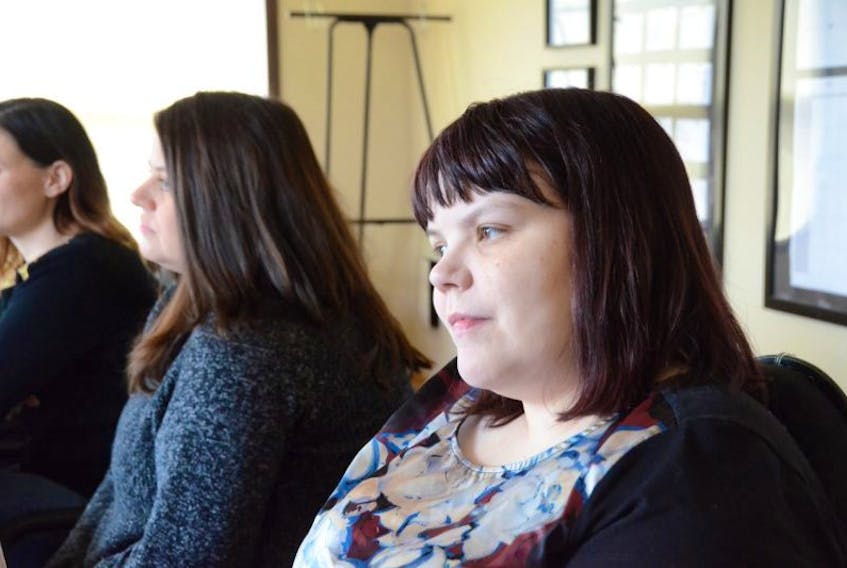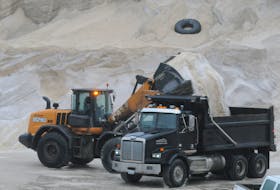
“I spent the next year applying for anything I might be both remotely qualified and physically able to do. I knew that I wasn’t going to be able to go and pour hot coffee; it just wasn’t something I was going to be able to do,” said Martin-Hanlon, who uses a wheelchair. “But I was applying for anything and everything, like so many people my own age.”
After about a year, she learned of Easter Seals’ Horizons Skills Link program, which helps young adults who face barriers to employment gain the skills and experience they need to enter the workforce.
She figured the 36-week work placement for the program would help her gain experience. She ended up getting a placement at Easter Seals House, and has been working there ever since.
As communications co-ordinator, she has a pretty broad set of tasks, including posting to the website and social media, issuing news releases, distributing newsletters and working on events and presentations.
“I feel really lucky to work here,” she said. “When my placement was here, I knew I had no worries. I knew that the washroom would be accessible to me. I knew that the kitchen will be accessible to me. I knew that GoBus went here. I knew that the drop-off point would be clear and safe, even in the winter,” she said, listing basic considerations that some of us don’t have to worry about.
She said she knew at Easter Seals, there would be no physical barriers.
“And I also knew there wouldn’t be any barriers when it came to attitude — I didn’t have to prove myself, that just because I use a wheelchair I was just as good of an employee as anybody else. I knew that that attitude was already here when I came in.”

Not everyone gets to work for Easter Seals, but some companies have also made a point of trying to create accessible, inclusive environments. The Horizons project has developed relationships with Mary Brown's and Shoppers Drug Mart, for instance. Paula Hayes, director of career and employment services at Easter Seals, said participants have also been placed with other organizations, such as the YMCA.
“Participants go out four days a week, back one day a week, with the goal of sustained employment or return to post-secondary at the end of the project. They get paid through their employer and their wages are reimbursed at 50 per cent,” Hayes said.
The biggest challenge, she said, is getting employers to take part.
“It’s not the clients. It’s not people with disabilities. They want to work. They’re eager to work. It’s getting employers on board,” she said. “It’s the attitude, and the perception, that persons with disabilities can’t do the same as somebody else in the workforce.”
Easter Seals also co-ordinates the Opportunities Fund for Persons with Disabilities, which negotiates wage subsidies with employers to help get people with disabilities into the workforce.
Hayes said that program can cover up to 80 per cent of minimum wage for up to 36 weeks, and offers placements in communities around the province. The opportunities fund also offers money to employers who want to add supports, such as specialized desks or even a grab bar, to their building, but Hayes said employers rarely take advantage of it.
“There’s the fear that it is going to cost a lot of money,” she said. But often, adjustments can cost nothing and just require a little flexibility — like breaking up a lunch break into two short breaks.
Down to business
It’s Kathy Hawkins’ mission to educate and support employers who may have misconceptions about hiring someone with a disability — not only for the sake of employees, but for customers.
She’s the manager of InclusionNL, part of EmpowerNL, which says 57 per cent of workplace accommodations cost nothing.
The same survey found that 78 per cent of people are more likely to support a business if they know it has a hiring policy for people with disabilities.

Hawkins knows there’s a lot of work to be done, but she’s already seen a huge shift in attitudes about hiring people with disabilities. She remembers the first time she set up at a trade show to advocate to employers, seven or eight years ago at the Atlantic Canada Petroleum Show.
“I was this tiny non-profit, stuck at this little tiny table. The table fees were outrageous, so we could only afford the smallest one available,” she said.
“I remember this guy from Calgary, this oil mongrel, coming up to me and saying, ‘What are you doing here?’ So I gave them my spiel, and he said, ‘And do you really think we’re going to hire people with disabilities?’
“I said, ‘No. But I’m going to be here next year, and I’m going to be here the year after, and I’m going to be here the year after that, and you’re eventually going to get the message.’
“And he laughed at me and said, ‘I believe you are right.’”
Inclusion at the job fair
Fast-forward to March this year, when InclusionNL and Hospitality NL organized the first inclusive job fair in St. John’s. Fifteen businesses paid to take part — and nobody asked Hawkins if she really expected them to hire people with disabilities.
In fact, the job fair inspired people in other communities to take initiative. The Trinity-Bonavista Area Chamber of Commerce and the Community Business Development Corporation invited her out to present to operators who were opening their bed and breakfasts, motels and hotels before the May 24 long weekend.
She said when she went out, there were about 30 people in the room eager to learn more about how to be more accommodating for their customers. They asked her to come back in the fall when the tourism businesses shut down for the season.
Improving accessibility: never say never

One of the first businesses to avail of InclusionNL’s individual Employer Support Services was Rocket Bakery and Fresh Foods. It’s a multi-storey business in downtown St. John’s — an area widely known for being inaccessible — with no elevator and no accessible bathroom.
“When we first approached Rocket, they said they felt they couldn’t do it because their washroom is on the second floor, and no matter what they did that wasn’t going to change,” Hawkins said.
But the bakery now, at least, has an option for customers who require an accessible bathroom. InclusionNL introduced Rocket to the Access Now map, a user-driven, Google-powered map that pinpoints accessibility features all over the world.

“We had an intern go down Water Street and propagate the map specifically for Blue Zone washrooms, and then we provided that to the staff at Rocket Bakery,” Hawkins said.
The washroom at Rocket may not be accessible, but at least now the staff can give customers directions to the nearest one.
For a time, the bakery displayed its menu in large print and Braille. It has since been taken down because the menu has changed, but a replacement should be up soon.
Hawkins said her group also worked with Rocket to ensure the order room downstairs was accessible, and to let them know just what accessibility features they had.
Focus on accessibility from the start
Husky Energy has also been conscious of wanting to provide all employees and visitors an accessible building at its Water Street location. The company occupies most of the office space at 351 Water St., a new East Port Properties building.
As a new build, it offered flexibility and Husky Energy became involved with outfitting its space, which covers five floors. The office floors feature wide aisles and doors with automatic door openers, coffee stations with lower counter heights and undercuts, and height-adjustable desks. Floors are colour-coded with strips of colour along glass dividers adjacent to the elevators — a feature of sleek design, but which also helps people with visual impairments.
For safety, as per code, there are light-emitting smoke detectors and emergency alarms.
As the company moved in, third-party walkthroughs were completed with representatives from organizations like EmpowerNL, to get suggestions. And the company has made changes since to improve the building’s accessibility.
It’s the simple things
The easiest and quickest thing an employer can do to be more inclusive, Hawkins said, is to simply talk to their employees about what they need.
Leanna Rowe, a registered nurse who works at the Health Sciences Centre in St. John’s, agrees. Rowe has a cochlear implant, and she uses a special — and rather expensive — stethoscope to do her job safely, but other adjustments don’t cost a penny.
“They are the small things, like asking people to speak clearly and slowly, while looking directly at me. I have challenges with the phone at times, particularly when my environment around me is noisy. I find that sometimes, no matter how many times you tell people and remind them, they often forget. Though I’m not mad or bitter about that, because it’s easy to forget sometimes,” she said, adding her implant can’t be seen.
She said some days, she is still hard on herself for things like asking a colleague to take a phone call she’s having trouble with, or missing the punch line of a joke everyone is laughing at.
“I think it is these small, everyday things that for most people with disabilities stings the most, and these are challenges that I embrace every day that I am still learning and growing from.”
While employees should let their employers know when something needs to be addressed, not everyone will speak up, she said, and employers may need to be the ones to broach the subject.
“Additionally, you can always bring in a third-party perspective that has experience in working and creating safer work environments. There are numerous non-profit organizations who have a broad knowledge and experience in inclusion and accessibility, who are more than happy to help work with employers to create better work environments.”
If you’re an employer who wants to learn more about what you can do, InclusionNL is there to help. A toll-free number has been set up for that purpose: 1-844-517-1376.
MORE IN THIS SERIES:
Mount Pearl man calls for Inclusion Now
Inclusion Now: Accessibility starts at home
Inclusion Now: NL Housing minister wants more accessible units
Inclusion Now: Accessible tickets to ride
Inclusion Now: Downtown could become more accessible
Inclusion Now: Welcoming classrooms
Inclusion Now: Students, past and present, object to listening test
Inclusion Now: Human rights complaints in N.L. often disability-related
Employees with disabilities: by the numbers
*78 per cent of Canadians are more likely to support a company that has a policy in place for hiring people with disabilities than a company that doesn’t. (Source: COMPAS, 2008)
*57 per cent of employees with disabilities don’t require any accommodations, and in 37 per cent where accommodation is required resulting in a one-time cost, that cost averages $500. (Source: U.S. Job Accommodation Network)
*90 per cent of people with disabilities in a DuPont study rated average or above average in job performance (Source: DuPont/Australian Public Service Commission)
*A Tim Hortons franchisee with six stores in Toronto, Megleen Inc., has a 35 per cent employee turnover rate, compared to the industry average of 75 per cent. That franchisee employes people with disabilities in every aspect of the business (17 per cent of employees have disabilities). In 2011, absenteeism among that 17 per cent was zero. In one case, productivity rose by 20 per cent after one employee with a disability was hired. (Source: Panel on Labour Market Opportunities for Persons with Disabilities)
JobsNL Wage Subsidy Program
Employers creating opportunities for unemployed or underemployed people, including those with disabilities, may be eligible for a 50 per cent subsidy.
The JobsNL Wage Subsidy Program is geared toward jobs for both EI-eligible and non-EI eligible workers in the private sector or with non-profit employers. It gives priority to people with disabilities, income support clients and people who recently graduated from post-secondary school. The Government of Newfoundland and Labrador website says it may also give priority to certain occupations and sectors.
The subsidy provides half a person’s wages, up to $8 an hour, for 10-26 weeks. It’s capped at $7,280 per position.
Opening Doors
The Government of Newfoundland and Labrador makes permanent, full-time public service jobs available throughout the province, specifically for people with disabilities, through its Opening Doors Program.
Employees are hired based on merit, but there’s a lot less emphasis on experience. The Office of Employment Equity for Persons with Disabilities of the Human Resource Secreteriat, which organizes the program, recognizes that a lack of job experience is a major obstacle for people with disabilities.
The positions are also protected from bumping.
To learn more, visit www.exec.gov.nl.ca/exec/hrs/disability_supports/employment_programs/opening_doors.html









